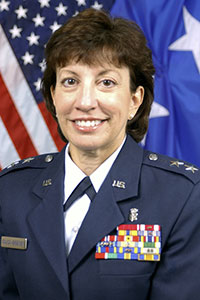NJ Air National Guard’s First Female Commander Credits Her Degree with Helping Her Reach New Heights
A plan to serve “two years and get out” has turned into a nearly 30-year career for Maj. Gen. Maria Falca-Dodson ’75.


Now a major general and the first female commander of the New Jersey Air National Guard (NJANG), Maria Falca-Dodson ’75 was a senior nursing student at TCNJ when she met an Air Force recruiter on campus. The encounter, she says, unveiled the allure of the military—a sense of adventure, the desire to serve, and the chance to make a difference.
“I got intrigued by that conversation and never forgot it,” Maria remembers. “It was something in the back of my mind that I wanted to do.”
Maria waited until 1980, working as a public health nurse and later getting a master’s degree in administration from Central Michigan University (1982), before being commissioned as a first lieutenant in the 108th Tactical Fighter Wing, NJANG.
A plan to serve “two years and get out” has turned into a nearly 30-year career. The reason she stayed? “The people and the mission—I absolutely loved it,” Maria says. “It was so much more fulfilling than anything I had done
in my civilian life.”
The passing years haven’t dulled her enthusiasm or that of her compatriots.
“These are unbelievably amazing people, and to be able to work in this environment every day and what I witness: It’s not just their dedication—they’re here 24 hours a day—they’re all ready at a moment’s notice to get on a plane and risk their lives no matter what,” she says. “That’s what so remarkable and continues to be after all this time.”
“I’ve worked with bright, dedicated people [in my civilian career], but the people in the military go beyond that measure of self-sacrifice.”
As a civilian, Maria’s nursing degree paved the way to enter the NJANG as a commissioned nurse, which proved to be “a great equalizer.” The reason: “Nurses were the first group to get commissioned by the military, prior to World War II, so there weren’t any barriers for me.”
Meanwhile, the nursing program’s rigorous standards reestablished key life lessons first learned at home and in high school—setting and achieving goals, staying organized—that further facilitated her transition. “There was no flexibility; they wanted certain accreditations,” says Maria, who attended TCNJ while working part-time and commuting from Hamilton. “You couldn’t get anything less than a C in any course.”
Maria attributes her rise in the military to “luck and good people I worked for and who worked for me. I had great mentors, and I’ve always had really dedicated people working for me that made me look good.” Peppering officers with questions and taking advantage of military educational opportunities also helped.
As for the fact that she’s the first female to hold her position, Maria pays it no mind “until someone tells me about it and I have to answer a question. Gender shouldn’t matter, and it hasn’t mattered in my case. I honestly think we’re kind of past that.” She says she encountered no flak from the men in her military life; in fact, some of her best mentors were male. “From a perspective of embracing sex, race, and ethnicity, the military has led the way,” Maria says.
Maria is less blasé in talking about community service. She believes it’s important to give back. This extends to her alma mater, where she sits on TCNJ’s alumni association and foundation boards.
The latter duty is especially apt. “College gave me the foundation for everything I’ve done in my life,” Maria says. “That degree opened every door for me.”
Posted on November 9, 2009

